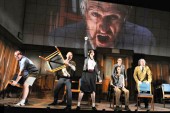George Orwell’s classic novel 1984 has become so engrained into our consciousness that we talk about Big Brother and Room 101 without giving their origin a second thought. The phrases have become part of our popular culture.
The trouble with writing a book set in the future is that you have to set it so far ahead that no-one will ever know if it really comes true, because if it doesn’t, you look a bit daft. Stanley Kubrick’s film 2001 is a prime example. No doubt space travel will become common-place but not for some time yet. The same applies to 1984. In that actual year, rather than the fictitious one, Big Brother was still a way off – but at least we had Margaret Thatcher to be going on with.
Nevertheless, thirty years on we are beginning to think that Mr Orwell may well have been on to something. However, the changes are so slow and the increments so small that they creep up on us and we don’t notice surveillance cameras on every block and armed police patrolling our streets in SUVs with blacked out windows. Possibly the powers that be (whoever they are) think that softly-softly is the best approach and that if they let Google and Facebook do the real surveillance, nobody will notice.
As I said, 1984 has become so much ingrained in our psyche, so prevalent to our daily lives that it was going to be interesting to see how it turned out on stage.
Headlong’s production got off to a slow start. An officey room, which doubled as everything else, with a giant overhead screen from which slogans were broadcast and on which Winston and Julia conducted their illicit affair (actually taking place in an off-stage back room but beamed live (I think) to the audience). There was lot of live video, the most successful being a close-up of Winston’s hands writing in his notebook.
Matthew Spencer was a suitably low key and bewildered hero, foolishly believing that 2+2=4, but to me the beginning was lack-lustre, boring even. Knowing now what I didn’t know then, I think that may have been deliberate because it showed a very marked contrast to the second half of the production – there is no interval just a lot of noise and flashing lights.
From the moment the affair was discovered and the couple were arrested we began to realise what Big Brother was really like. The set was violently dismantled before our eyes, gradually transforming into the sterile, all white box that was the dreaded Room 101. This is where the whole thing got very scary. The original story is scary enough but what we were witnessing now had a strange familiarity to it – hooded prisoners on their knees, security forces all in black with gas-masks, body armour and torches on their guns.
Torture used to be the prerogative of the bad guys, the very bad guys. Now we know it is common practice, even by the good guys. It is almost O’Brien’s friendly, brotherly concern for his victim that is the most frightening – you almost believe that Winston is being tortured for his own good. Flanked by white boiler-suited torturers who methodically do their stuff at the snap of O’Brien’s manicured fingers, poor Winston has no hiding place until he reaches enlightenment and realises that in fact 2+2=5
This production is gruesome, truly frightening and above all disturbing stuff and not for the feint hearted. But the second half is also brilliant, thought-provoking theatre. Visually it is jaw-droppingly good with Chloe Lamford’s visuals capturing the essence of the piece and Natasha Chivers’ atmospheric lighting adding light and shade.
Tim Dutton was excellent as the suave, be-suited and chilling O’Brien but apart from Matthew Spencer, the rest of the cast, with the exception of Andre Flynn as a sort of omni-present android, lacked oomph. The post-arrest part and Messrs Spencer and Dutton’s performances in room 101 were absolutely breathtaking, the rest of the production less so. If I was judging 1984 on the second part I would want to exceed my quota of 5 Stars but, as it is, only ★★★★☆


